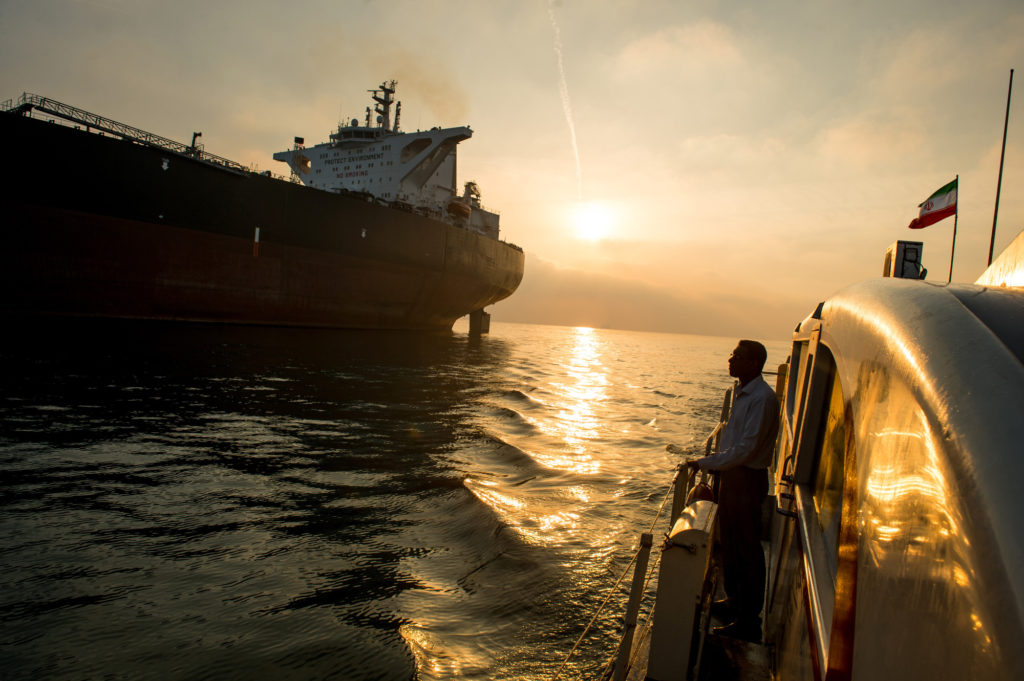
India will deposit payments for crude oil imported from Iran into escrow accounts of five of their banks held with state-run UCO Bank Ltd. after the two nations agreed on a payment mechanism to overcome U.S. sanctions, according to people with knowledge of the matter.
Iran will use part of the deposits for purchasing essential goods from India and to meet expenditure incurred by its diplomatic missions in the South Asian nation, the people said, asking not to be identified because the information isn’t public. All spending will be in Indian rupees.
Continued supplies is crucial for India, a country that imports nearly 80 percent of its annual crude requirement, as Tehran offers better credit terms than other Middle East oil producers and, in the past, has accepted payments in Indian rupees, rather than U.S. dollars. The south Asian nation purchased crude worth about $9 billion from Iran in the financial year ended March 31.
The payment mechanism will allow India to continue oil purchases despite sanctions as it fulfills President Donald Trump’s goal to choke money going directly to Iran. Washington has also granted an exemption for India. Refiners such as Indian Oil Corp. and Mangalore Refinery & Petrochemicals Ltd. will make payments after the mechanism is officially notified, the people said.
Spreading Risk
Also, payment into multiple escrow accounts will reduce the risks of Iranian bank accounts being frozen in case the U.S. brings new banks under sanctions, the people said.
“We already have 15 Iranian bank accounts, out of these five have come under secondary sanctions,” UCO Bank Managing Director Atul Kumar Goel said Tuesday, adding that the remaining 10 are eligible for bilateral trade between India and Iran. Finance Ministry spokesman D.S. Malik declined to comment.
India and Iran followed a similar mechanism previously when the U.S. imposed sanctions in 2012. At that time, 45 percent of the dues were paid into escrow accounts in India of Iranian banks and the remaining settled in euros through an overseas bank.
“This will help UCO Bank boost its CASA and profitability,” Goel said, referring to the low-cost deposits. During the previous sanctions also, UCO Bank was solely holding the payments for Iranian oil, that swelled the state-run lender’s profit to highest on-record in fiscal year 2013-14. The bank has been reporting losses since Iran sanctions were lifted in 2015.
Shares of UCO Bank gained as much as 6.9 percent in Mumbai today before paring the gains to 4.1 percent at 11:01 a.m. local time.
Now, Iran will use the money to import goods ranging from food to medicines and settle the dues in Indian rupees. It will also draw money from these accounts to pay all costs, including rentals, salaries and other administrative expenses of its missions in India, they said.
Under the exemptions granted last month, U.S. allowed India to import as much as 300,000 barrels a day of Iranian oil for 180 days. That’s less than Iran’s average daily exports to the nation of about 540,000 barrels this year, and almost 450,000 barrels in 2017, shipping data compiled by Bloomberg show.
Exports to Iran stood at $2.65 billion during the last financial year, including rice, spices, tea, yarn, medicines and various industrial products, according to India’s Directorate General of Commercial Intelligence and Statistics, an arm of Ministry of Commerce and Industry.